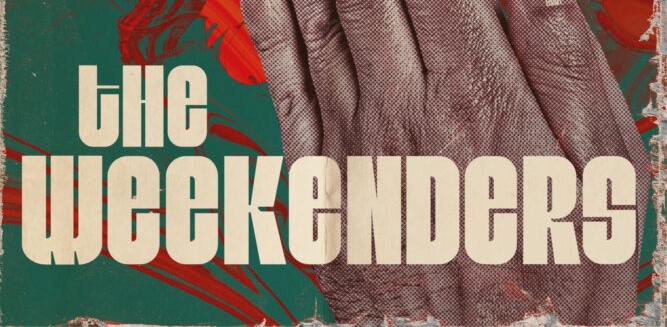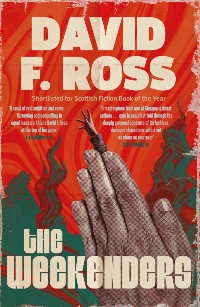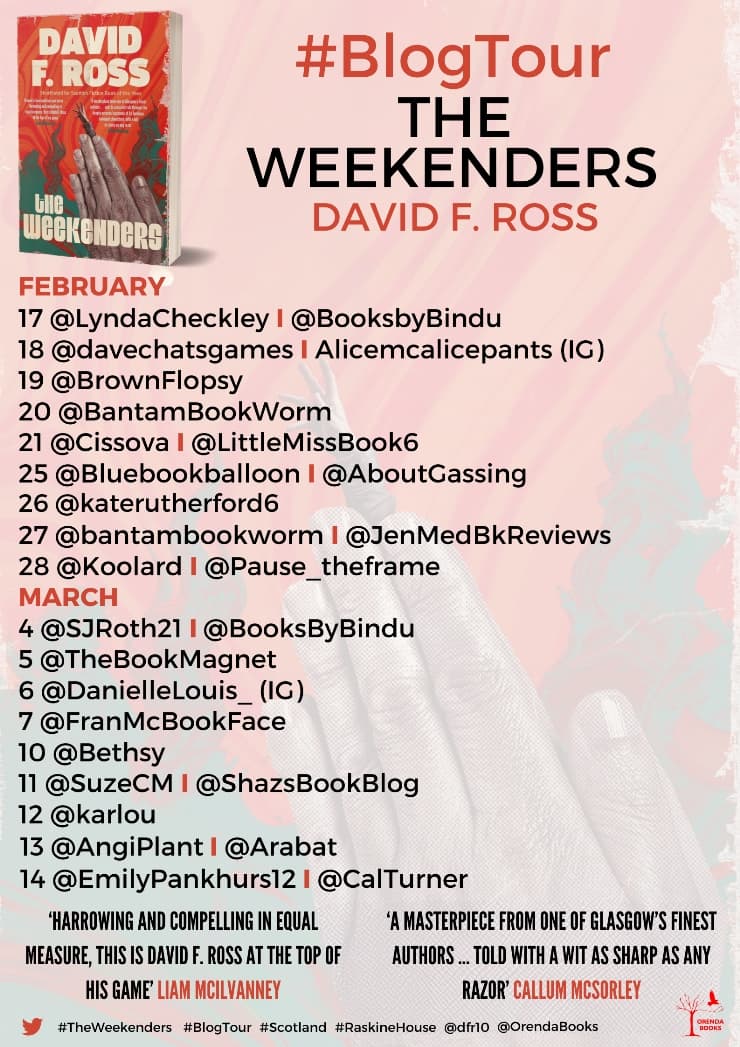Blog tour: The Weekenders by David F. Ross

This post is part of a blog tour organised by Random Things Blog Tours. I received a free copy of the book in return for an honest review.
‘Glasgow, 1966: Stevie “Minto” Milloy, former star footballer-turned-rookie reporter, finds himself trailing the story of a young Eastern European student whose body has been found on remote moorland outside the city. How did she get there from her hostel at the Sovereign Grace Mission, and why does Stevie find obstacles at every turn?
‘Italy, 1943: As the Allies fight Mussolini’s troops, a group of young soldiers are separated from their platoon, and Glaswegian Jamesie Campbell, his newfound friend Michael McTavish at his side, finds himself free to make his own rules…
‘Glasgow, 1969: Courtroom sketch artist Donald “Doodle” Malpas is shocked to discover that his new case involves the murder of a teenage Lithuanian girl he knows from the Sovereign Grace Mission. Why hasn’t the girl’s death been reported? And why is a young police constable suddenly so keen to join the Mission?
‘No one seems willing to join the dots between the two cases, and how they link to Raskine House, the stately home in the Scottish countryside with a dark history and even darker present – the venue for the debauched parties held there by the rich and powerful of the city who call themselves “The Weekenders”.
‘Painting a picture of a 1960s Glasgow in the throes of a permissive society, pulled apart by religion, corruption, and a murderous Bible John stalking the streets, The Weekenders is a snapshot of an era of turmoil – and a terrifying insight into the mind of a ruthless criminal…’

The Weekenders, by David F. Ross, covers three time periods. We start in 1960s Glasgow with footballer-turned-sports-reporter Stevie “Minto” Milloy, who suspects there’s a link between a murdered Eastern European woman, the Sovereign Grace Mission, and Jamesie Campbell, the rich and powerful local man whose family owns the newspaper Minto works for. However, voicing these suspicions gets him into trouble.
We then go to Italy in the 1940s, when the aforementioned Campbell and his compatriot Michael McTavish go off the rails while separated from their unit. The story they fabricate when they return to the army, and their subsequent elevation to hero status, forms a lifelong bond neither would ever dare to break.
We then switch back to Glasgow later in the 1960s, when troubled courtroom artist and Sovereign Grace Mission member Donald “Doodle” Malpas makes a link between the church and two Lithuanian women who have been found dead in similar circumstances. He discovers that Jamesie Campbell and his infamous country pile, Raskine House, are also involved, but can he really be the one who brings the whole scheme crashing down?
The Weekenders is a good read, but maybe not for the faint of heart! The author certainly doesn’t hold back, whether he’s portraying the harshness of life for those down on their luck in 1960s Glasgow, the atrocities of the Second World War, or the cruelties and depravities of the irredeemable characters at the heart of the novel.
Ross’ rich, detailed descriptions of scenes from the past have an authentic feel that allowed me to get caught up in the story and invest in the characters (well, the less problematic ones, anyway!). His inclusion of Raskine House’s intriguing past, and use of different media to portray this, further adds to the “realness” of the story.
Even though most of the action takes places in the 1940s and 1960s, this book feels very timely. Jamesie Campbell – a rich, powerful psychopath who’s looking to get into politics – literally owns the media, and has the law in his pocket, so he, and by extension, not-so-holy man of the cloth Michael McTavish, seems untouchable and able to get away with anything.
While Stevie and Donald have their good and bad qualities, their position as everyday people who want to find out what’s going on, and question why nobody else seems to be joining the dots, puts you squarely in their corner.
Donald is particularly interesting to read about: the bombs that dropped on Glasgow when he was a child left him traumatised and partially deaf, but he can hear more than he lets on, and is more intelligent than people think. He’s an unreliable narrator, but it’s understandable given his history. There’s also a suggestion of the supernatural in his narrative that I’m not sure I quite “got”, but am hoping will become clearer to me in future instalments of this new series.
The Weekenders is absorbing, expansive, and timely.
